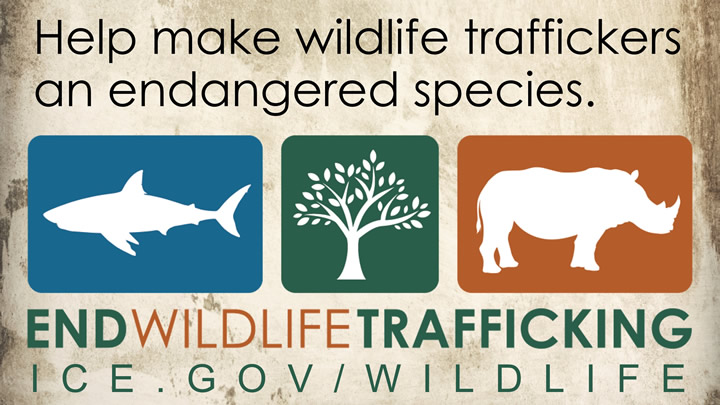WASHINGTON – The National Intellectual Property Rights Coordination Center (IPR Center) announced today a memorandum of understanding (MOU) between the University of Washington (UW) Center for Environmental Forensic Science (CEFS) and Homeland Security Investigations (HSI) signed by Jim Mancuso, IPR Center Director, and Samuel Wasser, Executive Director, UW-CEFS. The MOU designates UW-CEFS as an academic partner, facilitating the exchange of institutional knowledge, research, and best practices to support the fight against wildlife and natural capital trafficking violations.
“Shared interests, challenges, and goals – that is what today is about,” said Mancuso. “The IPR Center is grateful for the University of Washington’s Center for Environmental Sciences partnership in the fight against wildlife and natural capital trafficking. Collaboration with our public and private partners throughout the globe supports our efforts to increase enforcement and reduce the demand for illegally traded wildlife and natural resources.”
“The center has productively collaborated with HSI’s environmental crimes and international programs for nearly a decade,” said Wasser. “Combining science with HSI investigative proficiencies can potentially identify links to multiple crimes that may have otherwise been thought to be independent. Our engagement in capacity building to transfer skills and encourage collaboration is essential to combating transnational crimes.”
HSI’s wildlife trafficking initiative focuses on investigations regarding the illegal trade of protected, endangered, and non-native species. The Endangered Species Act of 1973 makes it unlawful for any person subject to the jurisdiction of the United States to import or export certain species into or from the United States or to possess, sell, deliver, carry, transport, or ship any species in interstate or foreign commerce. HSI utilizes its customs authorities to pursue criminal prosecutions when wildlife is smuggled over the border. HSI is also an active participant in the Presidential Task Force on Combating Wildlife Trafficking, which was established by presidential executive order to develop a national strategy for combating wildlife trafficking and develop recommendations to include in the administration’s strategy to combat transnational organized crime.
Since 2015, HSI has worked with UW-CEFS to obtain samples of seized ivory for research and to determine the origins of the poached ivory while establishing linkages to past seizures, post analysis, from Africa and Asia, which further aids HSI’s ability to link multiple ivory seizures to their traffickers. HSI attachés in Singapore, Angola, Cote D’ Ivoire, Thailand, Uganda, Kenya, Mozambique, and Tanzania, have participated in joint ivory DNA sampling operations with UW and host country officials.
HSI and UW-CEFS have most recently expanded their analytical efforts to include other forms of environmental contraband, such as pangolin scales, lion bone, rhino horn and illegally harvested timber, which are increasingly commingled with ivory shipments.
The IPR Center recognizes the importance of collaborating with partners, such as UW-CEFS, which is acknowledged worldwide for pioneering the application of genetic traceability to forensic analyses of transnational wildlife crime to help identify, detect, disrupt and dismantle transnational criminal organizations engaged illicit trafficking of wildlife and natural capital.
If you suspect you have received illicit goods or believe you know of illicit goods being trafficked, contact the Tip Line at 1-866-347-2423, fill out the online tip form, or contact the closest HSI field office. You can also report suspicious activity through the IPR Center’s online tip form.
About the IPR Center
For more than two decades, the IPR Center, working collaboratively with its public-private sector partners, has led the effort in the government's response to combat global intellectual property theft and enforce intellectual property rights violations. The center was established to combat global intellectual property theft – and, accordingly, has a significant role policing the sale and distribution of counterfeit goods on websites, social media, and the dark web.
About the University of Washington Center for Environmental Science
The UW-CEFS aims to advance forensic methods and opportunities to disrupt and dismantle transnational environmental crimes through collaboration across multiple disciplines and domains. Based at the University of Washington, CEFS is a collaboration of diverse scientists, state, federal and international law enforcement agencies, nongovernment organizations, and the private sector, devising strategies, tools, and opportunities to discover and disrupt operations of transnational criminal organizations. The center collaboratively determines what is need-to-know to strengthen investigations and prosecutions, develop, and validate the combination of tools needed to achieve those ends, and capitalize on collective skills, experiences, and connections to maximize their application where most needed.




